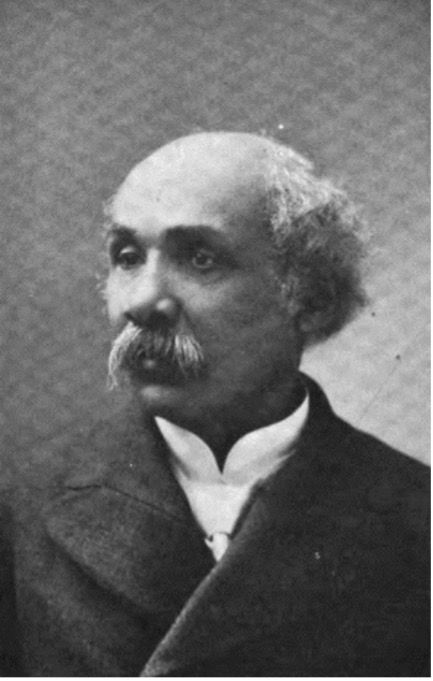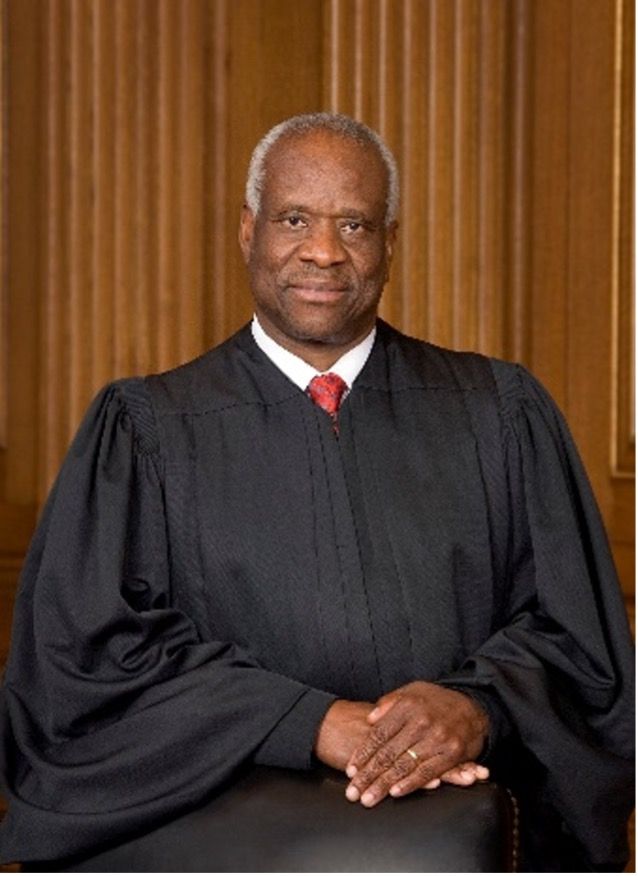A Tale of Two Thomases
Is the Universe a factory of human prototypes? Some people have similar facial features or gestures but they're not from the same family, race or nation. (Sounds strange, but go with me.) Now ask - are there personality types that repeat throughout history in the same way issues and events reoccur?

The scandal surrounding Supreme Court Justice Clarence Thomas stoked debate on whether his failure to report gifts of yacht trips, art, and collectibles from a right wing, Nazi memorabilia collector broke a law or underscored a need for an ethics refresh at the high court. Respect for the court took a dive after the justices overturned Roe V. Wade, and the body continues to hit record lows in approval ratings. But this isn’t about that. Justice Thomas seems to be an ironic character to me, a Black man in apparent denial about racism and all-things challenging to Black lives in America. A former Black nationalist who benefitted from Affirmative Action but doesn’t believe other students from marginalized groups should have that opportunity.
I wondered if we have had another Clarence Thomas-type in history? The short answer is, yes.
This opinion piece from me will require a leap of faith. Here’s why, I spend at least 50 percent of my time viewing the world from a metaphysical lens. That means I ponder non-physical or spiritual meanings of people and events. In one of my deep contemplations, I had a thought that the Universe is a big factory of human prototypes. Notice how some people have similar facial features or gestures but they aren’t from the same family or the same race or nationality? (I know this sounds strange but go with me on this). Take that idea and then ask the question; are there personality types that repeat throughout history in the same way issues and events reoccur?
I decided to look for other ironic characters along the same vein of Clarence Thomas and I found another Thomas! The earlier Thomas was born 105 years before the Justice, and he stimulated as much debate, disappointment and disdain as Thomas today.

Meet the Thomases
William Hannibal Thomas was born in 1843 into an enslaved family although he was considered mulatto and insisted that most of his ancestors were white. Thomas was the first Black student admitted to Otterbein College in Ohio. While at the school, he battled racism and was kicked out for playing a role in riots there.
As a decorated soldier, he fought with the U.S. Colored Troops in the Civil War and had his right arm amputated after being shot in battle.
In his professional life, Thomas became an author, teacher, journalist, legislator, and judge. In 1860, he published the pamphlet, Land and Education. In it, he promoted ways for Black people to own land and criticized White people for creating barriers to land ownership. He also wrote a series of articles for the national newspaper, The Christian Recorder about Black life, politics, and religion. Thomas became an established advocate for arming Black citizens as self-defense against White supremacist violence.
In 1878, he was appointed U.S. consul to what is now Angola by President Rutherford B. Hayes. During that time, Thomas faced allegations of financial and moral improprieties from church, state, and local officials.
But by 1901, Thomas flipped. He wrote, The American Negro in which he denigrated Black people harshly, particularly Black women using derogatory remarks of laziness, “immersed in poverty, stifled with immorality, and steeped in ignorance.” He said that it wasn’t skin color but traits of character that caused prejudice. He clearly discounted the systemic causes of poverty, denials of opportunity, and structural racism that plagued Black Americans. Racists used his writings to support their White supremacist ideas. The publication earned Thomas the nickname, Black Judas, and he became one of the most anti-Black authors in American history.
Booker T. Washington, a prominent Black conservative of the time, said about Thomas, "The author of this book condemns practically every method that has been used for lifting up the negro; everything is wrong except that which he advocates, but which he himself, it seems, has failed to put into practice anywhere in the South. . . He advocates industrial education all through his book yet condemns it as it now exists in many negro schools at the South.”
Washington called out contradictions such as Thomas’ use of anecdotal information and the lack of research in his writings. Washington and other Black leaders at the time were outraged by Thomas’ publications. He was discredited by them, accused of hypocrisy, and their uproar kept him from publishing. He eventually withdrew from society and was known to be bitter and anti-social. Thomas’ historical footprint is a bit hit-and-miss because at times he published under several assumed names.

Justice Clarence Thomas
A descendant of enslaved people, Clarence Thomas was born in 1948 in a small, Black community outside of Savannah, Georgia. His father abandoned the family when Thomas was two years old, and his mother sometimes worked for pennies as a domestic worker.
While attending College of the Holy Cross in Massachusetts, Thomas co-founded the Black Student Union and participated in a walk out when Black students were disciplined for violations that were also committed by White students without penalty. He attended anti-war marches and witnessed the 1970 Harvard Square riots, conducted in protest of the trial of Black Panther Bobby Seale.
It was during his years at Yale Law School that Thomas reportedly became disillusioned with the North and developed a belief that white people, whether Northern liberal or Southern conservative, are incurably racist.
It was also at Yale where Thomas pivoted from left-leaning to passionate conservative. The story goes that in 1972 Thomas lost his wallet and it was returned by a white student. The act surprised and impressed him. The white student was John Bolton, a former member of the Trump administration. They have been lifelong friends.
As with William Thomas, many of today’s Black leaders are critical of Clarence Thomas and frustrated by his actions and rulings. The NAACP opposed his appointment to the Supreme Court citing his "inconsistent views" on civil rights issues, his opposition to affirmative action, his conduct as head of the Education Department's Office for Civil Rights, and as chairman of the Equal Employment Opportunity Commission.
They concluded that Judge Thomas's confirmation “would be inimical to the best interests of African Americans."
In the Center for American Progress publications, Billy Corriher called Clarence Thomas the Anti-Thurgood Marshall.
He wrote, “With his recent comparison of affirmative action to slavery, Justice Clarence Thomas appears determined to undo the civil-rights and equal justice accomplishments of his predecessor, Justice Thurgood Marshall.”
Corriher made this comparison:
As a lawyer for the National Association for the Advancement of Colored People, or NAACP, Justice Marshall argued and won many cases before the highest court in the land. Justice Marshall served on the Court for 24 years and amassed a record as a strong protector of individual rights. As a Supreme Court justice, he worked to shore up the legal and political victories he won as a civil rights lawyer.
Before becoming a judge, Justice Thomas worked at the U.S. Equal Employment Opportunity Commission during the Reagan administration, where he limited the use of class action lawsuits to enforce workplace discrimination laws. . . His positions in the Court’s recent civil rights cases demonstrate that he may be more opposed than any other justice to the government’s consideration of race in programs that help African Americans.
On June 25, 2013, Justice Thomas voted with the majority in Shelby County v. Holder to strike down the Voting Rights Act’s system for determining which states must “pre-clear” any changes to voting by state and local governments due to a history of discrimination in voting. In a 5-4 vote, the majority ruled that the Voting Rights Act’s system for deciding which governments were subject to the preclearance requirement was “unconstitutional in light of current conditions.”
Not surprisingly, today’s Thomas, as with the earlier Thomas, has been accused of hypocrisy and impropriety.
In 2011, the advocacy group, Common Cause, reported that Justice Thomas failed to disclose $686,589 in income his wife earned from The Heritage Foundation, and instead reported "none" on his Supreme Court financial disclosure forms. Thomas said the disclosure of his wife's income had been "inadvertently omitted due to a misunderstanding of the filing instructions".
In 2021, the Washington Post revealed that Ginni Thomas apologized to a group of Thomas's former clerks on the email listserv "Thomas Clerk World" for her role in contributing to a rift-related to pro-Trump postings and former Thomas clerk John Eastman, who represented Trump in some of his failed lawsuits filed to overturn the election results.
Last year, texts between Ginni Thomas and Trump's chief of staff Mark Meadows were handed to the Select Committee on the January 6 Attack. The texts show Ginni Thomas repeatedly urged Meadows to overturn the election results and she repeated conspiracy theories about ballot fraud. Two dozen Democrat members of the House and Senate demanded that Thomas recuse himself from cases related to the January 6 insurrection, citing his inability to be impartial in those cases.
And here we are again, several years after being appointed to the Supreme Court, Thomas has maintained close ties with right-wing, gift-giving megadonor, Harlan Crow. Crow has lavished Thomas and his wife with expensive gifts and vacations that Thomas has failed to disclose.
The similarities of the two Thomases are astounding.
As a Black woman, I am baffled as to how any Black person can fail to see the effects of racism in matters of law, business, economics, jobs, all aspects of American life. Structural racism is clearly documented in American culture and will require decades to cure. I also don’t understand how someone who benefitted from Affirmative Action would shut the door behind him, when evidence of White privilege and preference are made so obvious today.
One theory is that there are members of oppressed groups who will assume the value system of the oppressor, and no matter how accomplished, continue to seek approval and acceptance even when it is in opposition to their own interests.
Despite living during times of harsh racism and overt discrimination based on race, William Thomas and Clarence Thomas provided comfort to racists by normalizing their bigotry, and challenging efforts to gain and preserve equity and basic human rights.
My takeaway is that we do have twin souls or similar characters who come through to physical existence, over and over again. And it is our responsibility to recognize patterns of behavior and to learn from them.
As for the two Thomases, I live in the hope that the laws of karma, if not the laws of man, provide the balance.
Namaste!
